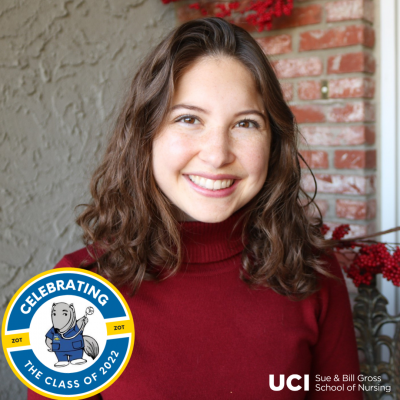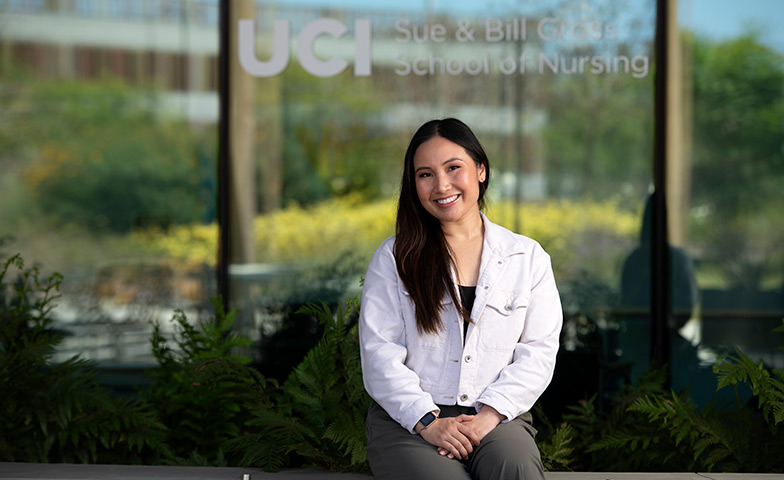
Fourth-year BSN student Juliana Chalfin is a recipient of the Chancellor’s Award of Distinction.
Juliana Chalfin, a fourth-year BSN student at the UCI Sue & Bill Gross School of Nursing, is one of the university’s outstanding graduating seniors. She was selected for the Chancellor’s Award of Distinction for her commitment to cutting-edge research, leadership and service to the university.
Associate Professor Sanghyuk Shin says she has contributed significantly to the success of his COVID-19 and tuberculosis research programs, including as a lead author on a forthcoming paper, Association between HIV co-infection and delayed diagnosis with tuberculosis bacterial load in setting with widespread antiretroviral therapy use.
Chalfin was connected to Shin because of her interest in public health and disparities in healthcare. She has worked on several projects related to epidemiology during the past three years and has received grants through the Undergraduate Research Opportunities Program (UROP) and Summer Undergraduate Research Program (SURP). Her publication, Association between HIV co-infection and delayed diagnosis with tuberculosis bacterial load in setting with widespread antiretroviral therapy use, is in preprint.
Why is tuberculosis research important?
While TB is not prevalent in the US, this research is important, as globally TB has remained a leading cause of death from an infectious disease. We have known about TB for over 100 years, yet there are still major gaps in knowledge regarding the disease progression and transmission dynamics.
While TB is curable and preventable, it is still highly prevalent in countries with low socio-economic status, poor health conditions, and barriers to access to health care.
Some scientists have described the high prevalence of TB and HIV as a “syndemic,” as the intersection synergistically magnifies disease burden and elimination requires multidisciplinary prevention and treatment.
What do the findings of your study mean?
I recently presented my study, “Association between HIV co-infection and delayed diagnosis with tuberculosis bacterial load in setting with widespread antiretroviral therapy uses,” during the UROP symposium.
The findings of my study suggest that even with widespread antiretroviral therapy (the treatment for HIV) use, increased immunosuppression remained associated with decreased tuberculosis (TB) bacterial burden. This means that people living with HIV are less likely to transmit TB to others.
Implications of this study involve the need to prioritize resources and contact tracing for TB infected individuals living without HIV since they are more likely to transmit TB than those individuals with HIV.
How did Sanghyuk Shin’s mentorship help you?
Dr. Shin’s mentorship has helped me better understand how to interpret and gather meaning from such a large amount of data. While the data can be overwhelming and seem disassociated from people, it is important to remember the context of the study population and refocus the analysis to be relevant toward living conditions.
Not only did I gain data analysis skills through statistical programming and creating graphic figures to visualize the data, but Dr. Shin has helped me communicate the significance of a problem and highlight solutions and implications.
How did UCI nursing prepare you for a nursing career?
UCI and the School of Nursing have provided multiple opportunities for me to get involved in my community, gain leadership opportunities, and understand research methods relevant to improving health care. Working with Dr. Shin has been an incredible experience, and I am fortunate to have him as a mentor in my educational and research pursuits.
Through researching with Dr. Shin and his team, I have been able to apply these learned skills to an area I feel passionate about, involving population health and disparities.
Research has been an important part of my educational path and an essential tool in my future nursing career. I believe it will enable me to be more evaluative regarding research studies and implement evidence-based practice in patient-care settings.
For more information, to support a future nurse or nurse-led research, please connect to Juliana Goswick, Director of Development at jgoswick@hs.uci.edu or visit Giving.




Leave A Comment